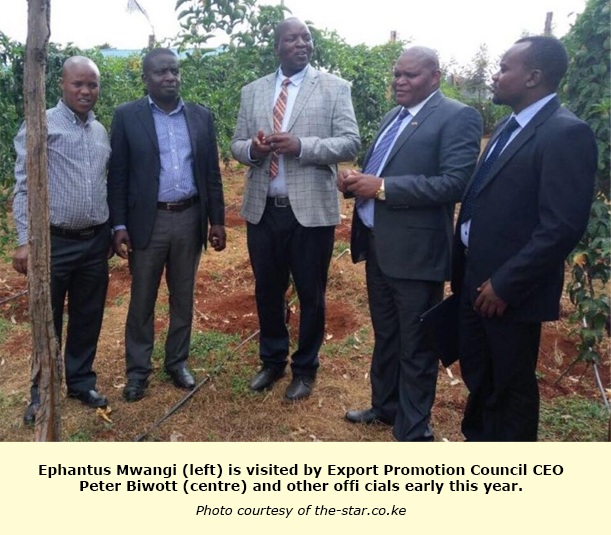Farmer Ephantus Mwangi in Kitale had not considered farming until he and his wife Pauline visited the Netherlands at the invitation of a Dutch couple with whom they worked on youth mentorship.
Their passion was helping pregnant teens, young mothers and babies, and they set up a rescue home outside Kitale town.

Visiting that food-secure country in northwestern Europe got them thinking. The Netherlands is only the size of Central Kenya, yet it’s a major food exporter and known for agriculture technology.
With this in mind, they sought to marry agriculture and mentoring young people in Kitale. They started agribusiness on five acres to sustain the home with 40 girls and helping them return to school.
In 2010, they purchased an Amiran farming kit, including a greenhouse with all necessary farming equipment.
“We started with tomatoes, following the instructions of our advisers. The project was quite successful and we adding another five greenhouses,” Mwangi told the Star.
But success wouldn’t last long.The tomatoes were attacked by a deadly fungal and wilt disease that drastically reduced production.
They needed another idea, this time they went for fruit.
“We needed a crop that resists wilt and can produce a good harvest and income,” Mwangi said from his Elite Farm in Kitale.
They researched and experimented with a grafted variety of passion fruit. The young farmers were full of hope for their breakthrough variety.
Mwangi’s Elite Farms worked with Fruited Plains, a Kitale-based organisation that provides seeds and seedlings to small-scale farmers.
that deals in passion fruit seedlings for small-scale farmers. “We bought seedlings and planted our half acre with passion fruits. The venture was successful, despite challenges,” Mwangi says.
Now his farm produces passion fruit and watermelon that he exports to the European Union, an enviable destination.
“We are also using Elite Farm as a demonstration farm, helping hundreds of farmers from around the country — Narok, Bungoma, Eldoret and elsewhere,” Mwangi said.
They harvest 100 kilogrammes of passion fruit every week, then sort and pack it for direct export to the EU.
Mwangi has become prominent for his expertise and has travelled widely, learning best agriculture practices and attending fairs in China, the US and Canada.
To be certified to export to the EU requires strict standards and procedures. A KenyaGAP (Good Agriculture Practice) certificate is required from the Fresh Produce Exporters Association of Kenya (FPEAK).
A farmer submits an application with details of the farm and crops. Then KenyaGAP auditors visit the farm for a baseline audit. Two or three are required, each costing Sh5,000 (USD 49) per day. An external audit can cost Sh80,000 (USD 490) per day.
An audit considers internationally accepted practices in growing fresh produce. It aims to ensure food is safe to eat, of good quality and does not contain GMOs. Chemical residue must be scant. Much Kenyan produce cannot be exported because of chemical residue from heavy use of pesticides.
An audit also aims to ensure the growing environment is conserved and the health and safety of workers are guaranteed.
Farmers are advised exactly what they need to do, including time frame and budget. This is followed by training on Good Agricultural Practices (GAP) at the Fresh Produce Exporters Association of Kenya (FPEAK). This covers use of fertilisers and pesticides, among other things.
This is followed by a final certification audit for domestic or international scope.
“Certification also proves to the world you are environmentally conscious and care about your workers,” Mwangi said.
Arim Ogolla of FPEAK says certification is renewed annually after annual inspections. He advises would-be farmers to keenly research their areas of interest to achieve maximum output.
He added that Kenyan exporters have an advantage in that the EU laws now make a provision for individual East African states to apply for legal authorisation to export to the EU, unlike in the past where the East African Community needed to work as one.
“We as Kenya can now export freely without having to deal with other countries, who have in the past slowed our efforts,” he said.
Supermarkets worldwide and in Kenya require certification of produce from their suppliers. The costs of certification vary, depending on the number of audits needed and requirements of the target market.
The process is tedious and can involve a lot of waiting and repetition.
For Mwangi, it was worth it. Once you get it right with the certifying bodies, you don’t need to market because the quality product easily sells itself, he said.
“There is money to be made and the joy of being paid for fine exported produce is worth any effort.”
The income has sustained the rescue home and transformed the lives of mothers and babies. The girls go back to school and Mwangi pays their fees, thanks to his passion fruit and watermelon.
Written by Mercy Gakii, The Star
